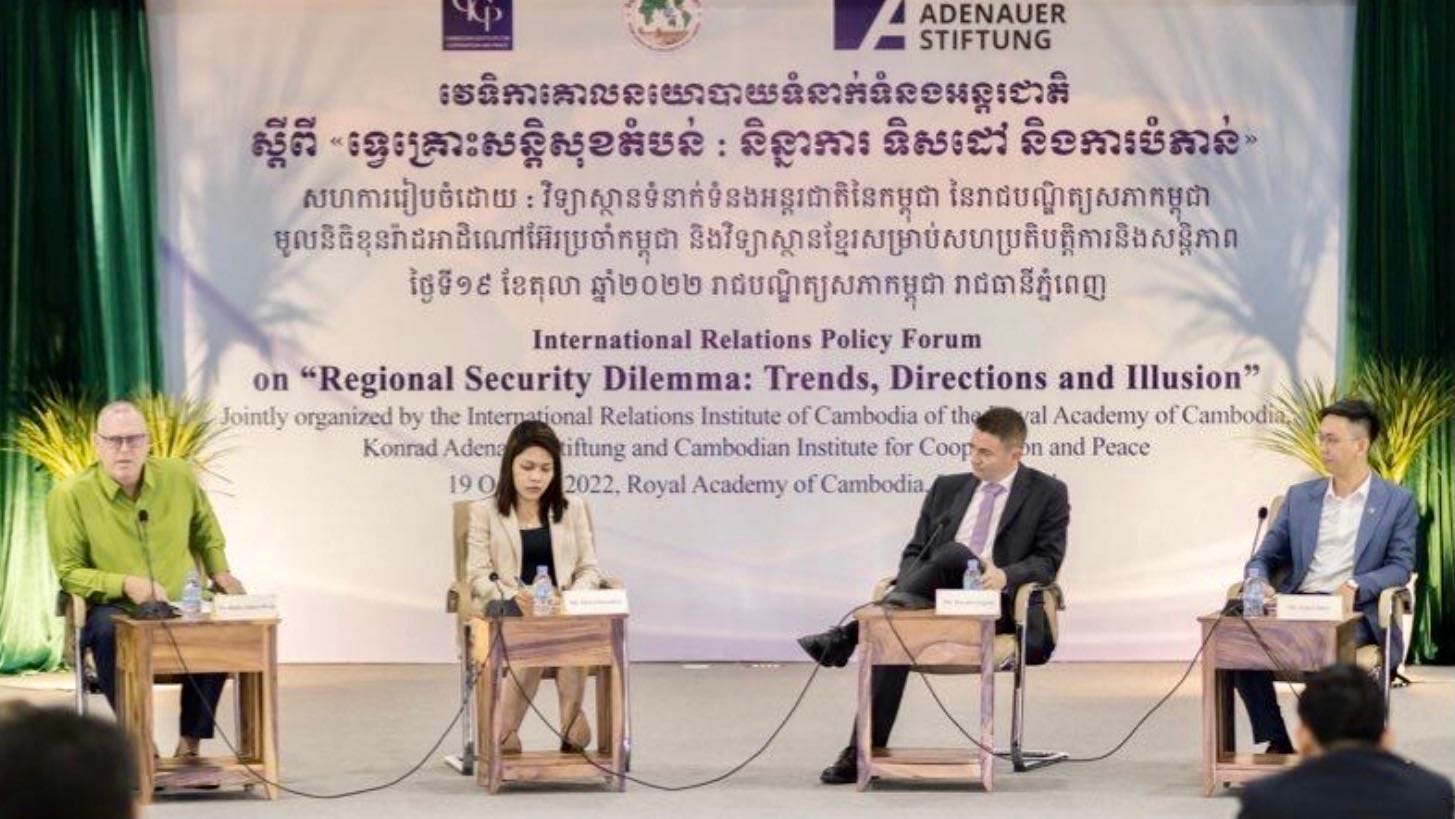International Relations Policy Forum on “Regional Security Dilemma: Trends, Directions and Illusion"
Welcoming Remarks by H.E. Dr. Kin Phea Director General of the International Relations Institute of Cambodia, Royal Academy of Cambodia.
On behalf of the Management and Staff of the International Relations Institute of Cambodia (IRIC), and especially on behalf of His Excellency Academician Sok Touch, President of the Royal Academy of Cambodia, I have the great honour and privilege to welcome all of you here to this International Relations Policy Forum under the theme of “Regional Security Dilemma: Trends, Directions and Illusion.” This forum was jointly organized by the International Relations Institute of Cambodia (IRIC), Royal Academy of Cambodia (RAC), the Konrad Adenauer Stiftung (KAS) and the Cambodian Institute for Cooperation and Peace (CICP).
Excellencies, Ladies and Gentlemen,
The end of the Cold War led to an important paradox. While the end of the bipolar world order resurrected confidence in globalism, it also emboldened the world’s single super-power, the United States, to act unilaterally. Over the last decade, however, the rise of China altered that trend with bilateralism and regionalism becoming the primary direction.
Geographical proximity impacts security interaction most strongly, and most obviously, in the military, political, societal, and environmental sectors.
While the cause and conditions of security problems remain the subject of much academic debate, security operates at both the domestic and regional levels. A security complex is defined as a group of states whose primary security concerns link together closely enough that individual state security cannot realistically be considered independently from proximate states. Thus, the term ‘security complex’ indicates both the character of the attribute that defines the set security and the notion of intense interdependence that distinguishes any particular set from its neighbours. Security complexes emphasize the interdependence of rivalry, as well as that of shared interests. However, the basic assertion that security interdependence tends to be regionally focused is strongly mediated by the power of the individual units concerned.
For example, the wide-ranging interests and massive capabilities of superpowers are manifested in the conduct of their rivalries at a global scale. The possession of great power, therefore, tends to override regional imperatives and weak states, which seek great power protection, undermine regional imperatives. Thus, smaller states often find themselves locked into a regional security complex with neighbouring states.
This gives rise to two important questions: first, whether the existence of the regional security complex only exists in terms of the “discursive” construction of regions?; and second, whether regional security complexes are exclusive or overlapping.
In this context, an important dilemma for many small states is how best to maintain a distinction between their demands for the preservation of preferences, based on the argument of special vulnerability, and the demands of other developing countries for the retention of these preferences as an indispensable development tool.
Excellencies, Ladies and Gentlemen,
Today’s International Relations (IR) Policy Forum is also the official launch of Konrad Adenauer Stiftung (KAS) Cambodia Office’s flagship publication “Diplomatic Briefing,” which is available in both Khmer and English language versions. The English version was made possible with the assistance of the Cambodian Institute for Cooperation and Peace (CICP), and the Khmer version was completed with the support of the International Relations Institute of Cambodia (IRIC). I am proud to say this is the third time that “Diplomatic Briefing” has been translated into the Khmer language within the cooperation framework between Konrad Adenauer Stiftung (KAS) and the International relations Institute of Cambodia (IRIC).
Today’s International Relations (IR) Policy Forum aims to examine our region’s security dilemma(s), identify trends, illusions and directions, and assess the role and behaviour of small states. The forum objective will be elaborated upon via panel discussion with the participation of distinguished experts in the fields of international relations and foreign policy.
Before proceeding to the panel discussion, Ms. Pich Charadine, Deputy Executive Director of the Cambodian Institute for Cooperation and Peace (CICP), will make a brief introduction to KAS Cambodia’s “Diplomatic Briefing Issue No. 5: Regional Security Dilemma: Trend, Direction and illusion”.
Excellencies, Ladies and Gentlemen,
To conclude my remarks, I wish to extend my sincere appreciation to both Konrad Adenauer Stiftung (KAS) and the Cambodian Institute for Cooperation and Peace (CICP) for their kind and generous cooperation, which has made this forum possible.
I also extend my sincere thanks to the forum’s distinguished speakers and panellists, all of whom are well-known experts in their respective fields, and also to the panel moderator for being so kind as to share his knowledgeable insights, which make this forum both thought-provoking and timely. Finally, I would like to extend my warmest thanks to Your Excellencies, ladies and gentlemen, and the distinguished participants for taking your precious time to join this forum.
I wish you all very good health and great success!




